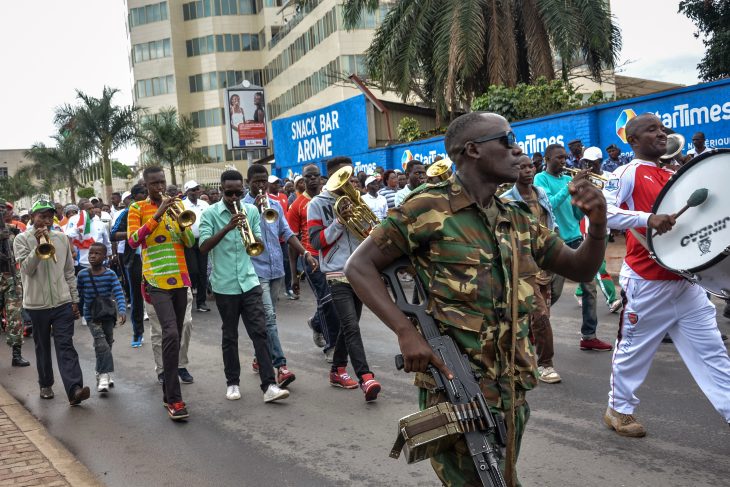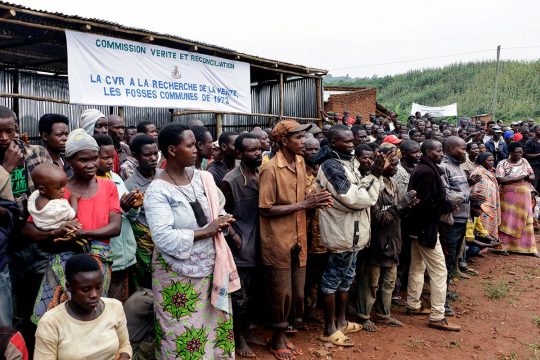Burundi's withdrawal from the Rome Statute of the International Criminal Court (ICC) entered into force on October 27, 2017. It is the final act of a divorce proceeding that began well before it was formally notified to the UN Secretary-General, twelve months ago. Indeed, the circumstances under which in 2004, Burundi ratified the Rome statute had already the appearance of a marriage of convenience doomed to fail, at the first couple quarrel. Be that as it may, by becoming the first state to exit the ICC, Burundi is also opening the blank page of this Court's jurisprudence on the effects of a withdrawal.
The Rome Statute of the ICC entered into force in Burundi on 1 December 2004. Nineteen months earlier, in June 2003, the country had already experienced its first threat of withdrawal from the ratification process while it was reaching its final stage. On April 17 and 22, 2003, in just six days, the draft bill of accession to the Rome Statute had been adopted respectively in the Council of Ministers and the National Assembly. The legislative process stalled in the Senate, two months later, because of a controversy on “Article 124” of the ICC statute. It reads that a State, on becoming a party to the Rome Statute, may declare that it does not accept the jurisdiction of the Court with respect to war crimes when such crimes are alleged to have been committed by its nationals or on its territory. It was only after a court battle that a narrow circle of insiders within the executive branch backtracked, first from their plot to apply article 124 without the knowledge of the Council of Ministers and the Parliament[1], then from their attempt to withdraw the draft bill from the ratification process. It took a ruling from the Constitutional Court of Burundi[2] to force the Government of Burundi to complete the process of enacting the Rome Statute Ratification Act, despite the absence of a vote in the Senate.
The question of the "preliminary examination"
Today, the withdrawal of Burundi from the ICC raises with more acuity than twelve months ago the question of its effect on the “preliminary examination” of Burundi case, which was first announced on April 25, 2016 by Ms. Fatou Bensouda, the ICC Prosecutor. She is cautious and shows restraint on the matter. “We think we have at least a year to complete this examination and open an investigation if that is the conclusion that we come to” she said[3]. “At least”, indeed, what about beyond? Article 127, on the withdrawal from ICC, is puzzling. It ends with “(….) nor shall it prejudice in any way the continued consideration of any matter which was already under consideration by the Court prior to the date on which the withdrawal became effective.” Academics themselves only agree on the ambiguity of the text, which leads to different interpretations, because of imprecise wording such as “continued consideration” or “under consideration”. Somehow, the French and the English versions of the statute add to the confusion by the substantial difference in the wording used in one and the other version. Some invoke general international law to decide the matter, for lack of possible arbitration by the statute or by the reference texts produced by the Rome statute preparatory commission[4]. In this regard, the regime-orchestrated “Bye Bye ICC” demonstration which took place in the streets of Bujumbura this Saturday morning seems premature. In any case, can the ICC play any role other than a sword of Damocles? The Kenyan precedent has demonstrated its limits in case of non-cooperation by a state, even when it did not withdraw from the ICC.
The prospect of a Constitution revision
On Burundi domestic scene, each time an air bleed valve is closed, the temperature rises further in the oven. The prospect of a Constitution revision to pave the way for Pierre Nkurunziza’s fourth consecutive presidential term has only brought a dose of toxicity to the air, already charged with a heavy and audible silence. Depressurizing the oven requires the strong emergence in Burundi of an opinion which deconstructs the sectarian, populist and aggressive narrative of those in power on the one hand, the opposition legalistic narrative, in weightless conditions, on the other. Between the two, Burundians have demonstrated an exceptional resilience that is an undeniable strength for those who know how to listen to it and set it in motion. We must sincerely hope that all this is done peacefully.
[1] At no time did the official presentation and debate on the status of the ICC held in April 2003 at the Council of Ministers and the National Assembly address the issue of Article 127, about which no mention was made.
[2] This ruling (RCCB 57 of 25 July 2003) obliged the Government to promulgate the law but not to deposit the instrument of ratification at the United Nations Secretariat General. The deposit was made only one year and three weeks after promulgation.
[3] Fatou Bensouda: "Burundi is obliged to cooperate with the ICC until October 2017", Great Lakes Info, November 4, 2016
[4] Whiting, A., If Burundi Leaves the Int’l Criminal Court, Can the Court Still Investigate Past Crimes There?, in Just Security
crimes-there/, visited on 27 October 2017. Parmela Capizzi, « Le retrait du Burundi du Statut de la Cour pénale internationale : quelles conséquences ? », La Revue des droits de l’homme






